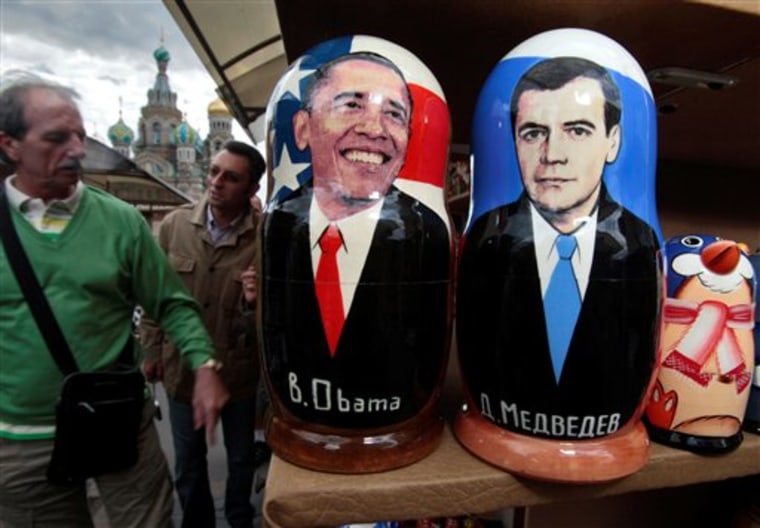President Barack Obama said strengthening human rights and the rule of law in Russia should be a part of the much-heralded "reset" in U.S.-Russian relations, according to an interview with an embattled Russian opposition newspaper.
Obama also said he applauded President Dmitry Medvedev's efforts to reform Russia's creaky judicial system, according excerpts released by Novaya Gazeta before Obama's arrival Monday in Moscow, when the full interview to be published.
"I agree with President Medvedev when he said that 'freedom is better than the absence of freedom'," Obama was quoted as saying. "I see no reason why strengthening democracy, human rights and the rule of law cannot be included as part of our reset" in relations.
The term "reset" refers to the pledge by officials in both countries to improve relations that had chilled markedly in recent years.
It was unclear whether Obama's comments were a signal that he intends to press Medvedev — or the man considered his co-ruler, Prime Minister Vladimir Putin — on judicial reforms or human rights issues during his two-day summit in Moscow.
Rights groups, U.S. lawmakers, and Russian and U.S. foreign policy experts have urged Obama not to ignore those issues in order to reach agreement with Medvedev on broader disputes — such as a new arms control treaty or NATO expansion.
A newspaper spokeswoman said the interview was conducted in writing, with the newspaper receiving answers to its questions at the end of last week.
Obama declined to answer the newspaper's question about Russia's most prominent prisoner — the former oil tycoon and billionaire Mikhail Khodorkovsky. The businessman's supporters say the criminal trial that convicted Khodorkovsky on tax evasion and fraud charges was designed to punish him for his political aspiration.
But Obama said he supported Medvedev's efforts to strengthen the rule of law in Russia, "which naturally includes making sure that all those accused of crimes have the right to a fair trial and that the courts are not used for political purposes," he was quoted as saying.
"I also believe that Americans and Russians have a common interest in the development of rule of rule, the strengthening of democracy, and the protection of human rights," he told the newspaper. "As I said in my inaugural address: "To those who cling to power through corruption and deceit and the silencing of dissent, know that you are on the wrong side of history, but that we will extend a hand if you are willing to unclench your fist."
U.S. and Russian officials have been trying to reach agreement on a successor agreement to the 1991 arms-control treaty known as START. The treaty expires in December and negotiators have struggling to have a framework deal ready for Obama and Medvedev to sign.
Among the biggest sticking points is the issue of U.S. plans for a missile defense system in eastern Europe. Russia vociferously opposes those plans and has sought to include that issue as part of any new arms control deal.
In the interview, Obama repeated U.S. assurances that the missile defense system isn't aimed at Russia.
"We are not building and will not build a system that is aimed to respond to an attack from Russia. Such thinking is simply a legacy of the Cold War," he was quoted as saying.
Novaya Gazeta is Russia's most prominent opposition newspaper and its most embattled, known for investigative articles and acid commentary about Kremlin policies. Four of its reporters have died in the past eight years — one beaten to death, one allegedly poisoned, two shot — the most recent on Jan. 19.
Medvedev himself gave his first newspaper interview to the publication, something Putin never did during his eight years as president.
